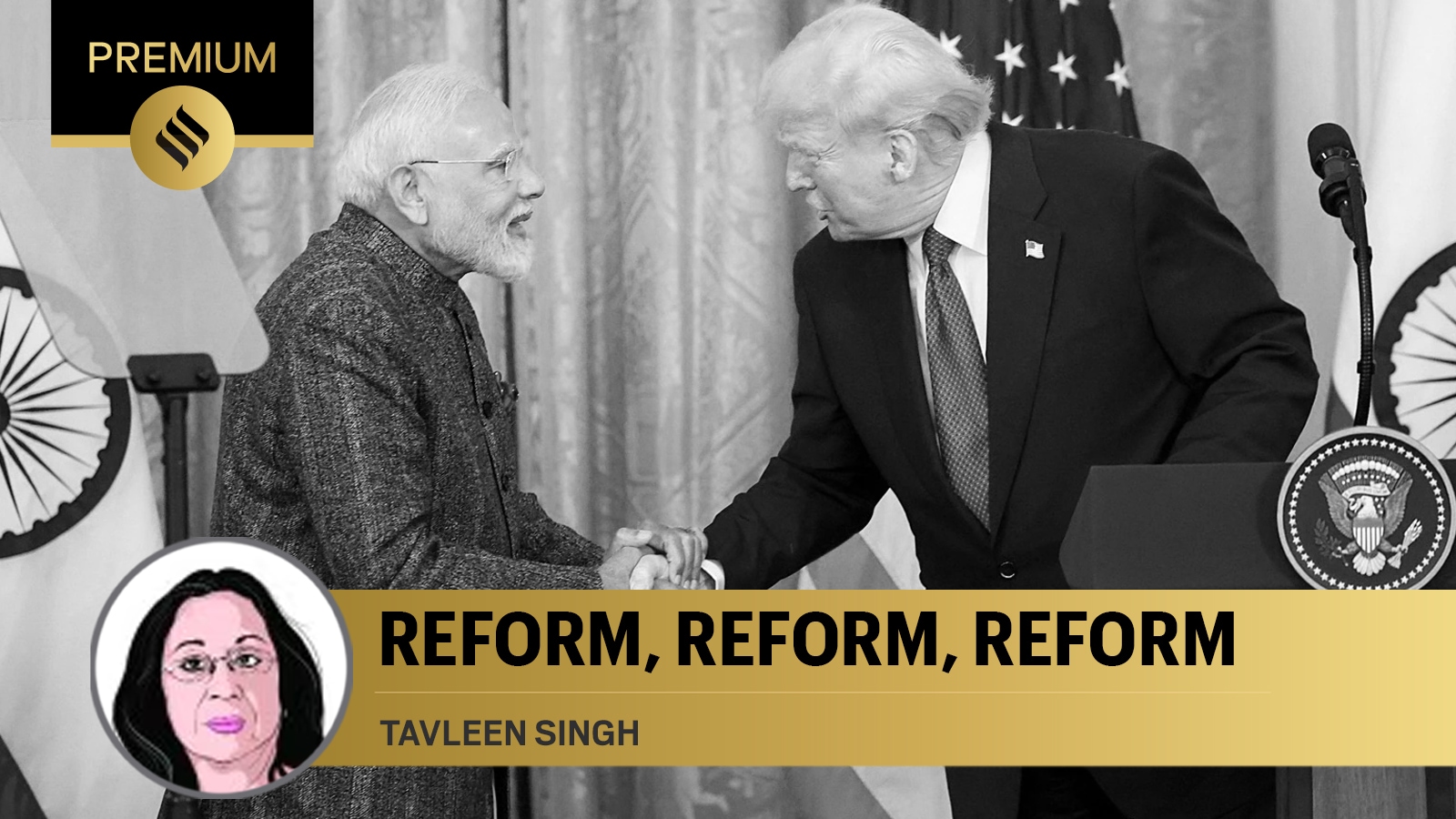Aug 10, 2025 10:46 IST
First published on: Aug 10, 2025 at 07:01 IST
From the moment that Donald Trump threw his tariff tantrum last week, a mood of gloomy patriotism started to spread across our ancient land. Debates on television became populated with angry panelists calling Trump a bully and an imperialist, and reminded him that India is a sovereign country that will not kowtow as we did when we depended on handouts of American grain to feed our ‘starving millions’. Comparisons with the East India Company’s brutal trading practices were invoked and influencers on social media wrapped themselves in the national flag and posted podcasts asserting that we are economically strong enough to withstand the 50% tariff that the American President has imposed on Indian imports.
The Prime Minister made a speech the day after Trump’s announcement in which he said that he would never betray our farmers. I am not sure why he made this about farmers and not Russian oil, but I am glad he did because it gives me a chance to urge him to bring about reforms that would make it easier for our farmers to compete in international markets. I know that farming reforms is a tricky subject because of the year-long agitation against his earlier attempts to reform agriculture, but let him keep in mind that farmers opposed those farm laws because they believed they would have helped corporations and not farmers.
If a fresh attempt began with massive investment in cold storage chains that would help farmers prevent more than 70 per cent of fruit, flowers and vegetables from dying in the fields, it is hard to believe farmers would protest. Last time, the Prime Minister was misled by urban ‘experts’ who said he should ignore the protests because the only farmers protesting were ‘rich’ Punjabi farmers. The Russian word kulak was carelessly thrown around, ignoring the sad truth that only 20 per cent of Indian farmers grow enough food to sell in markets. Thanks to those well-meant but mistaken land reforms in Nehruvian socialist times, nearly 90 per cent of our farmers barely grow enough to feed their families.
The stabbing in the back that Modi’s ex-best friend has done could be turned into an opportunity to bring reforms in other sectors as well. Is the Prime Minister aware that the multi-layered GST (Goods and Services Tax) has destroyed many small businesses? They simply cannot afford to employ a consultant to explain to them the devious nuances that this supposedly simple tax contains. One example will suffice. If you are exporting chairs, there should be a fixed rate. Right? Wrong. If the chair has a cushioned seat, it gets transferred to another category.
The tax has unleashed an inspector raj that rivals in ugly ways the old license raj. Modi seems to rely on bureaucrats a little too much, without noticing that this breed of Indian is interested much more in the perks and privileges of his job than in making it easier for businessmen to do business. Let us not delude ourselves into believing that it has become easier to do business in India than it used to be. It has not for a whole litany of reasons.
Hiring and firing workers requires government permission for businesses that employ more than 300 people. The bankruptcy law seems designed to punish businesses that have gone bankrupt instead of helping revive them as is the case in more advanced countries. And, most important of all, why has there been no attempt at all to reform our decrepit justice system? It takes decades for rapists, murderers and terrorists to be brought to justice. Reform is not complicated, as a lawyer friend explained to me. To rid us of the horrendous backlog in our courts, he suggested a time limit for getting rid of old cases, and time limits on the length of trials and the disposal of appeals. He also suggested younger judges at the top.
Another area in which urgent reforms are needed is urban planning. Last week we were reminded horribly that because of unplanned urbanisation in the Himalayas, whole villages and towns were swept away by the angry waters of the Bhagirathi. This happens every year. In the Prime Minister’s own constituency, we watch as Varanasi turns into Venice annually when the rains come. Most cities share this fate, so they drown in dirty water and garbage in the monsoon, and north India becomes a gas chamber in winter.
Modi reminds us often that under his leadership the Indian economy has gone from being number 11 in the world to number four and will soon be number three. It is a happy thought but let us not delude ourselves. If more than 80 per cent of our population needs subsidised food every month, it should be clear that we are not on the verge of mass prosperity. My point is that Modi should view this betrayal by his ex-best friend as a boon and not a catastrophe. It gives him a chance to go back to his old slogan, which I think went ‘reform, perform, transform’.
As for Trump and his insane trade war against India, will somebody remind him that this is the most pro-America country in the world. At least it used to be till last week. Hard to say if this will still be true by the end of this month if he goes ahead with his plan to impose that 50 per cent tariff on Indian imports.


